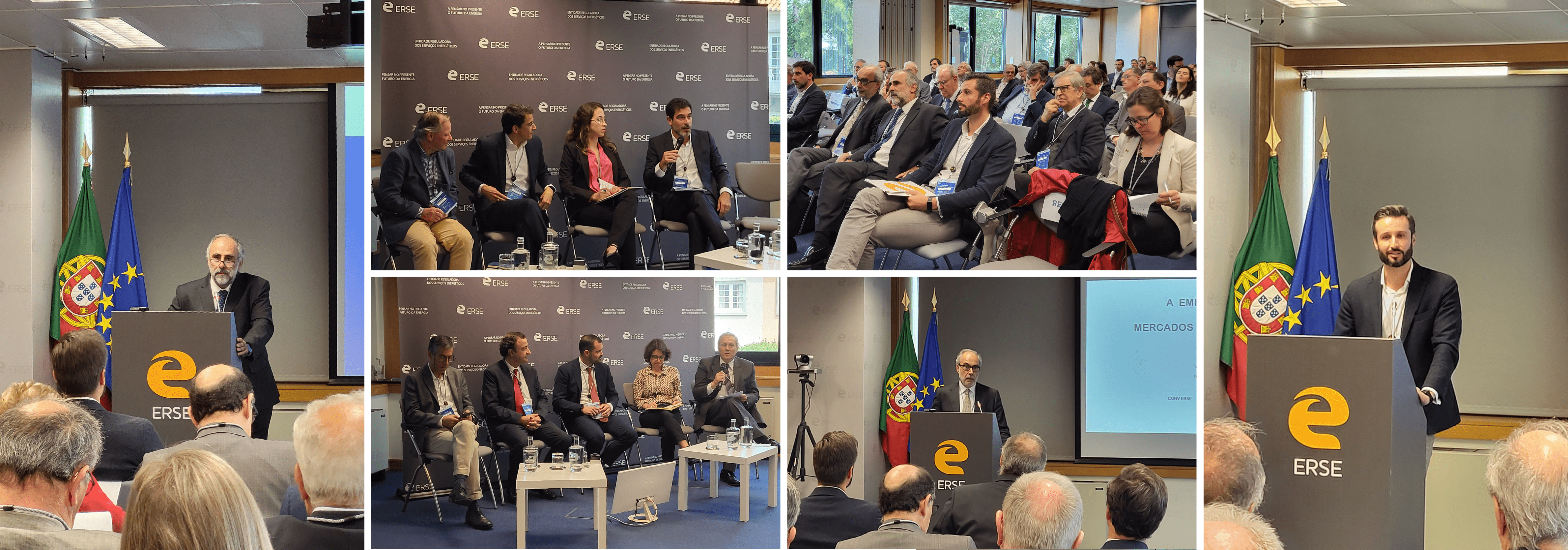ERSE discussed decentralisation and flexibility in the context of the emergence of local energy markets
14/04/2023
ERSE - the Energy Services Regulatory Authority - hosted another ConvERSE initiative on 13 April on “Decentralisation and Flexibility: the emergence of local energy markets”, which brought together around 500 participants in a hybrid format (face-to-face and online).
The discussion focused on the challenges and opportunities of creating local energy markets as a complement to investment in distribution grids, with the presentation of the E-Redes FIRMe pilot project in the Portuguese case, but also more advanced experiences at European level, coming from France and the UK, through the network operator ENEDIS and Self Energy UK respectively.
One of the main topics of discussion was the interaction of these local flexibility solutions with optimised network planning. From a planning point of view, the use of this new concept is pointed out as a possible alternative to traditional investments in electricity grids, whenever the flexibility services provided by distributed energy resources, whether for generation, consumption or autonomous storage, are feasible.
The decentralisation of production and, above all, the emergence of local flexibility solutions are fundamental to the decarbonisation process and energy transition, according to the Chairman of ERSE’s Board of Directors. Pedro Verdelho believes that for projects to be unlocked and become a reality, the administrative and regulatory procedures in place must be simple and appropriate to the scale of these new projects and business models, minimising the operating and transaction costs observed and reducing the barriers to their development. This will enable decarbonisation at lower cost, closer to people, more inclusive, in places that are already affected by human activity and therefore with fewer negative externalities.
For the Chairman of NEWES - New Energy Solutions and former Chairman of ERSE, Jorge Vasconcelos, the key issue in this energy transition process is to build a new energy system architecture: multi-sectoral, integrating all energy vectors, and multi-level, involving European, national and local levels.
Finally, some practical examples of local flexibility solutions were discussed - presented by CleanWatts, Águas de Portugal, NGEN Smart Grids and Coopérnico - with the aim of demonstrating that local flexibility solutions are a business model that responds to the needs of electricity grid operators, but also allows companies to benefit from the potential synergies of optimised operation of their assets.
Ricardo Loureiro, member of ERSE’s Board of Directors, who closed the session, stressed the importance of these debates in order to better identify the regulatory barriers that may limit the implementation of this type of projects. He also added that ERSE has chosen to promote the implementation of pilot projects in innovative areas, which will allow experience to be gained and the benefits and costs of the various solutions to be assessed in a highly transparent environment, with a view to subsequently moving towards their effective regulation and replication in a scenario of less uncertainty and risk.
See the presentations for more information:
Opening
- “A emergência dos mercados locais de energia”- Jorge Vasconcelos – Presidente da Newes – New Energy Solutions
Panel I – Mercados locais de energia: Complemento ao investimento em redes de distribuição
- "Flexibilidade: A emergência dos mercados locais de energia - Perspectiva da E-Redes" - Rui Gonçalves- E-Redes
- "Market based flexibilities - An overview of Enedis work on market-based flexibilities for a DSO use" - Pâmela Catrinque Martins - ENEDIS
- “Flexibilidade – a emergência dos mercados locais de energia – Exemplos de UK" - Miguel Matias- Self Energy UK
Panel II - Mercados locais de energia: Relacionamento entre pares e soluções de flexibilidade
- "Descentralização e Flexibilidade: a emergência dos mercados locais de energia" - José Basílio Simões - CleanWatts
- "Flexibilidade no Grupo AdP" - Miguel Águas - AdP Energias
- "NGEN - Energy System Solutions"- Nicolas Depoorter - NGEN Smart Grids
- "Cidadãos na Transição Energética" - Ana Rita Antunes - Coopérnico

Subscribe to ERSE’s Youtube channel.







